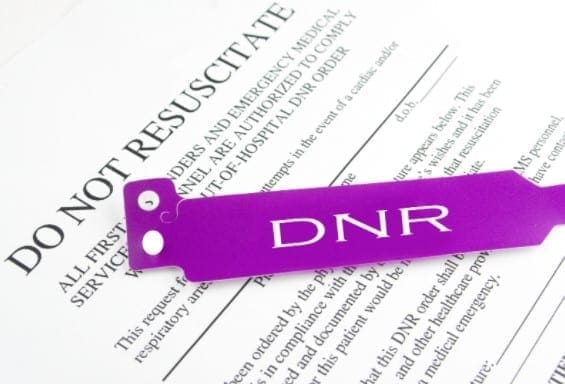What is a DNR?
“DNR” stands for Do Not Resuscitate and means that if you stop breathing, you will not be resuscitated. Most, otherwise healthy people, would want to be resuscitated if they collapsed and stopped breathing, for example, if they had a heart attack. Those who are terminally ill and are suffering may choose not to be resuscitated if their heart stopped beating or they stopped breathing.
Who Do You Sign a DNR With?
False Facts Friday issue 6 – I signed a DNR with my lawyer
A DNR is something that you execute with your PHYSICIAN, not your lawyer. A DNR is also something that can be executed by your Health Care Representative and is only a decision about CPR (cardiopulmonary resuscitation).
In Connecticut, bracelets are the only valid DNR identifier. This means that if 911 is called, a paramedic will attempt to resuscitate the individual if he or she is not wearing a DNR bracelet. Even if the family is standing there with the bracelet or DNR order in hand.
In 2005, The American Heart Association changed the traditional do not resuscitate (DNR) terminology to do not attempt resuscitation (DNAR). DNAR reduces the implication that resuscitation is likely and creates a better emotional environment to explain what the order means.
If You Don’t Sign a DNR With Your Lawyer, What Do You Sign?
The first part of the current Connecticut Advance Healthcare Directive form (and for some people the only advance healthcare directive that they have) is known as the Living Will. The Living Will is the statement that if a physician or an APRN (a nurse who has obtained at least a master’s degree in nursing) determines that you are in a coma or persistive vegetative state that the physician or APRN determines you will not come out of, then you do not want to be kept alive on life support machines. This is NOT a DNR.
What Is an Advanced Healthcare Directive
The Advanced Healthcare Directive is a legal, written instruction regarding your preferences for medical care if you are unable to make decisions for yourself. The choices you make in the AHD, guide doctors and caregivers if you’re terminally ill, seriously injured, in a coma, in the late stages of dementia, or near the end of your life.
Related Article:
Advance directives aren’t just for older adults. Unexpected end-of-life situations can happen to anyone, at any age, so it’s important for everyone to prepare these documents, regardless of your medical history or age. By planning ahead, you can get the medical care you want, avoid unnecessary suffering, and relieve caregivers and family members of decision-making burdens during moments of crisis or grief.
Find the right Advanced Healthcare Directive for you by state
Disclaimer: The information provided in this article does not, and is not intended to, constitute legal advice and is for general informational purposes only.
Let Us Know How We Can Help!
Please fill in your contact information and a brief message about what you need help with. A consultation will need to be scheduled in order to provide legal guidance.
Joan Reed Wilson Esq. – Managing Partner
Practices in the areas of estate planning, elder law, Medicaid planning, conservatorships, probate and trust administration, and real estate. Admitted to practice in the States of Connecticut and California, she is the former President of the CT Chapter of the National Academy of Elder Law Attorneys (NAELA), an active member of the Elder Law Section of the Connecticut Bar Association, accredited with the PLAN of CT for Pooled Trusts, with the Veteran’s Administration to assist clients with obtaining Aid & Attendance benefits for long-term care needs and with the Agency on Aging’s CareLink Network.





